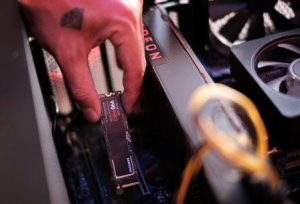Contents
Fundamental of Computer: Understanding the Basics in Simple Terms-14 Important facts
In this post, we’ll explore the basic concepts of Fundamental of Computer in simple language, shedding light on complex topics and providing a clear explanation of the “fundamental of computer.”
In today’s modern world, computers have become an essential part of our daily lives. These amazing machines have changed the way we live, work, and communicate.
let’s discuss fundamentals of computer

Photo by Samsung Memory on Unsplash
1. What is a Computer?
At its core, a computer is a device that processes information. It takes input, follows instructions, and produces output. The input can be anything from typing on a keyboard to touching a screen. The computer then performs operations on this input using programs, which are sets of instructions that tell the computer what to do. Finally, it produces output, which could be something appearing on a screen or a printed document.
2. Components of a Computer
A computer is made up of different parts that work together. The central processing unit (CPU) is like the brain of the computer, responsible for carrying out tasks and calculations. The memory stores information temporarily while the computer is running. Input devices, such as keyboards and mice, allow us to give commands to the computer. Output devices, like monitors and printers, display the results or information.
3. Data and Binary System
Computers use a special system called binary to work with data. In the binary system, there are only two digits: 0 and 1. It’s like having a language with only two letters. All the information in a computer is represented using these 0s and 1s. Each 0 or 1 is called a “bit,” and a group of eight bits makes a “byte.” This way, computers can handle data and perform tasks using these binary codes.
4. Fundamental of Computer Programming
Computer programming is like giving instructions to a computer in a language it understands. Programmers write code using programming languages to create software and solve problems.
Programming languages are like the computer’s language, and they allow us to communicate with it effectively. Examples of programming languages include Python, Java, and JavaScript.
5. Hardware vs. Software
Understanding the difference between hardware and software is essential in the fundamentals of computer concepts. Hardware refers to the physical parts of the computer, like the CPU, memory, and keyboard. On the other hand, software is the programs and data that run on the hardware, such as the operating system and applications.
You are reading Fundamental of Computer: Understanding the Basics in Simple Terms-14 Important facts

image source :trustedreviews.com
6. Operating Systems
An operating system (OS) is a vital piece of software that manages the computer’s resources. It acts like a conductor, making sure everything works together smoothly. The OS allows us to interact with the computer through a user-friendly interface. Popular operating systems include Windows, macOS, and Linux.
7. Storage Devices
To save and retrieve data, computers use storage devices. Traditional hard disk drives (HDDs) use magnetic storage to keep data, while newer solid-state drives (SSDs) use flash memory. Additionally, cloud storage lets us store data online and access it from anywhere with an internet connection.

image source : commons.wikimedia.org
8. Internet and Networking
The internet is a vast network of interconnected computers worldwide. It allows us to browse websites, send emails, and connect with people around the globe. Networking is the process of linking computers together to share resources and information.

Image Source : Unplash
9. Input and Output Devices
Input devices let us provide information to the computer. The keyboard is the most common input device, but we can also use mice, touchscreens, and microphones. Output devices display or present information to us. Monitors and printers are examples of output devices.
10. Computer Memory
Computer memory, also known as RAM (Random Access Memory), is crucial for the computer’s performance. It temporarily stores data and programs that the computer needs to access quickly. When the computer is turned off, the data in RAM is erased.
11. Graphics Processing Unit (GPU)
A Graphics Processing Unit, or GPU, is a special processor that handles graphical tasks. It’s used in applications that need complex graphics, like video games and video editing.
12. Computer Security
Computer security is vital to protect our data and privacy. It involves taking measures like using strong passwords, installing antivirus software, and updating software regularly to stay safe from cyber threats.
13. The Role of Computers in Everyday Life
Computers have become an integral part of our daily lives. They’ve revolutionized how we work, learn, and entertain ourselves. Computers have made information more accessible, improved our productivity, and connected us to the world.
14. Future Trends in Computing
As technology advances, computers continue to evolve. Exciting technologies like artificial intelligence, quantum computing, and the Internet of Things (IoT) are shaping the future. These innovations have the potential to transform industries and create new opportunities.
Conclusion
In conclusion, understanding the Fundamental of Computer is essential to navigate the digital world confidently. From the basic components of a computer to computer programming and the binary system, this post has provided an easy-to-understand overview of essential computer concepts.
Computers play an ever-increasing role in shaping our lives. Embracing technological advancements and expanding our computer knowledge will empower us to thrive in this digital age.
Whether you’re a tech enthusiast or a casual user, having a solid understanding of the Fundamental of Computer will enrich your digital journey. So, let’s embrace the exciting world of computers and embark on a journey of exploration and discovery
Friends, you have just read the post “ Fundamental of Computer: Understanding the Basics in Simple Terms-14 Important facts ” we hope you will like this post. If yes then share it with your friends and keep visiting our website for more such posts.
If you interested to read about Astrology & Hindu Religion : Click here
Also Read : Network Topologies: definition,types, classification,examples etc-A Comprehensive Guide
Also Read : Database Management System (DBMS) in detail with it’s definition,types, classification,examples
Also Read : Find My RAM: A simple method to know RAM of Computer
You were Fundamental of Computer: Understanding the Basics in Simple Terms-14 Important facts
Also read : Windows 11 vs Windows 10: A Comprehensive Comparison of the Two Operating Systems
Also read :What is Bus in Computer Systems: Understanding Its Role in Data Transfer
Also read :Computer Memory: An Introduction to Storing and Retrieving Data
Health & Wellness
Also Read : Heavy Periods after Pregnancy: Causes, Symptoms, and Management are explained in detail
Also Read : Women’s Reproductive Health: Empowering Women through Knowledge and Care
Also Read : Fatty Lower Abdomen No More: Secrets to a Trim and Toned Waistline
